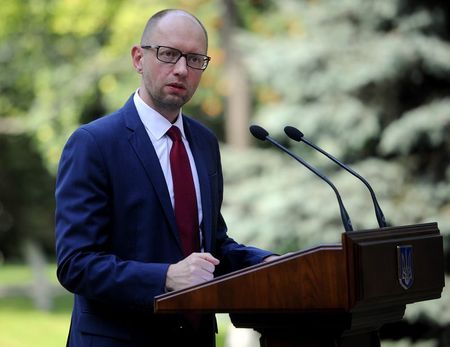By Natalia Zinets
KIEV (Reuters) - Ukraine's conflict with separatist rebels is draining the economy by the day and hampering efforts to implement reforms as required by an IMF bailout programme, Prime Minister Arseny Yatseniuk said on Wednesday.
According to the terms of a $17 billion International Monetary Fund loan package, Ukraine must implement set reforms, but the country, which is virtually bankrupt and running wide external deficits, has had to divert substantial funds in its fight to contain the pro-Russia insurgency.
Attacks by separatists on the infrastructure of the industrial east - mines, power stations, railways and bridges - were intended to strangle the economy, Yatseniuk told a government meeting.
"We're losing economic potential by the day ... Russia is aware that rebuilding the Donbass (the industrial east) will cost not millions but billions of hryvnia," he said.
Ukraine's economic decline has accelerated since the pro-Russian rebellion erupted in April when rebels set up separatist republics in its Russian-speaking east after political upheaval in Kiev led to the ousting of a Moscow-backed president and Russia's annexation of Crimea.
The economy contracted by 4.7 percent in the second quarter compared with the same period last year. With industrial output plummeting 12 percent in July, the economic outlook for the third quarter is not promising.
In June, Yatseniuk asked the IMF, which decides on the disbursement of the second tranche of $1.4 billion on Aug 29., to take into account the extra financial burden of fighting the insurgency.
FINANCIAL AID
He emphasised the economic toll of the conflict on Wednesday, expressing disappointment at the country's progress.
"I am dissatisfied with the speed and depths of reforms. But the steps we have taken will hopefully bring economic stability when peace returns to the country," he said.
To qualify for IMF aid, Ukraine agreed to abide by conditions including meeting deficit-reduction targets, raising the price of gas to households and industry and allowing the national currency, the hryvnia, to float instead of being pegged to the dollar.
Finance Minister Oleksander Shlapak said Ukraine wanted the IMF to combine the expected third and fourth portions of aid - a total of around $2.2 billion - to be paid before the end of the year to maintain the payment schedule, which has been delayed so far.
The financial aid from international lenders helped the central bank stabilise the hryvnia in May, but fears over the mounting economic and human costs of the conflict have hit the currency in recent weeks, causing it to weaken around 13 percent since mid-July.
Last week, central bank head Valeria Hontareva said the bank would keep intervening on the local foreign exchange market to offset a "mood of panic" pressuring the hryvnia, which is trading close to all-time lows against the dollar.
However Yatseniuk said there were signs foreign investors believe in the longer-term prospects for the Ukrainian economy.
Highlighting the recent purchase by a large foreign bank of 2.2 billion hryvnia (102 million pounds) of government debt with a maturity of 30 months, Yatseniuk said "it means that they have faith in the stability of the currency market and the economic recovery of the country".

(Writing by Alessandra Prentice and Richard Balmforth; Editing by Alison Williams)
